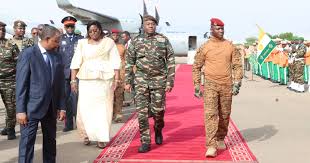
Leaders of the Alliance of Sahel States (AES) delivered strongly worded criticisms of France and the United Nations during this week’s General Assembly session in New York, signalling a deepening diplomatic rift with their former Western partners.
Speaking on behalf of Niger, Prime Minister Ali Mahaman Lamine Zeine accused France of supporting armed groups responsible for insecurity in the Sahel and condemned the “plundering” of natural resources, particularly uranium, which has been exploited for decades.
He also highlighted abuses linked to the colonial era and questioned the effectiveness and intentions of the French military presence in the region. “It is time to recognise the suffering endured by our populations and to turn the page on a past deemed unequal,” he said.
Malian Prime Minister General Abdoulaye Maïga criticised the UN for selective engagement, arguing that African conflicts receive far less attention and support compared to crises elsewhere.
Burkina Faso’s Prime Minister Jean-Emmanuel Ouédraogo echoed these concerns, denouncing what he described as a biased international approach and defending his government’s security policies against ongoing jihadist threats.
These speeches underscore a broader strategy by the AES to reduce dependence on former partners and explore alternative alliances.
Observers note that this diplomatic repositioning could reshape regional security dynamics and international cooperation in West Africa.
The estrangement from France began with the gradual withdrawal of French forces from the Sahel.
Mali ended Operation Barkhane and requested troop departures in 2022, Burkina Faso followed in 2023 citing limited results in counterterrorism efforts, and Niger terminated defense agreements in 2024 after political changes in Niamey.
These moves concluded over a decade of French military presence and opened the door to new regional security arrangements.
In addition to challenging France, the three states criticised the UN for perceived ineffectiveness, citing insufficient support for their militaries and failure to curb the spread of armed groups. They also announced their withdrawal from the International Criminal Court and proposed creating a regional Sahelian court to handle war crimes and terrorism-related cases locally.
As insecurity and humanitarian challenges persist across the Sahel, these developments mark a decisive moment in regional diplomacy, with potential implications for international peacekeeping, security cooperation, and the balance of influence in West Africa.



